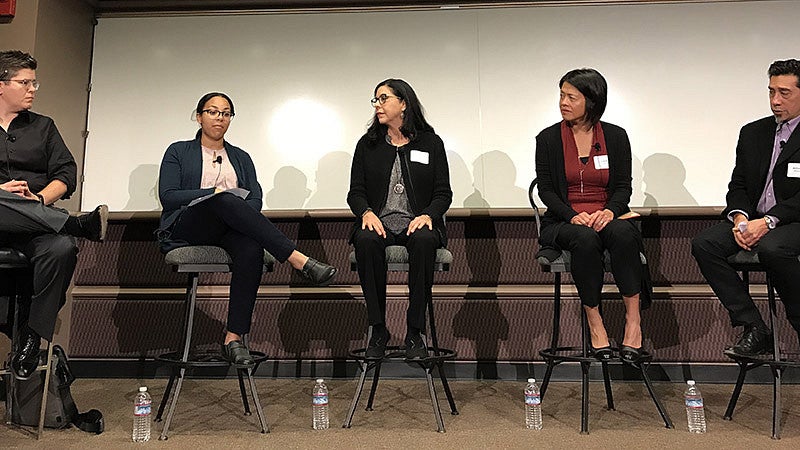The Department of English offers several distinctive minors that range from traditional studies in literature and rhetoric to more interdisciplinary studies that explore a wide range of texts, cultural materials, and new media.
Our minors are ideal for students who want to think creatively, hone their critical thinking, and become versatile writers. The skills gained in our programs provide vital preparation for business and professional careers, as well as for further academic work or artistic endeavors. The experience of our graduates has proven that studies in literature, rhetoric, and culture are an excellent background for law, medicine, teaching, management, publishing, advertising and advanced technology fields.
English Minor Requirements
The English Minor consists of 24 credits of approved course work (courses to be selected from those ENG, FLR*, HC*, and/or WR prefix courses listed in the annual Advising Supplement, a planning document that lists all courses offered in a particular year and what categories they satisfy).
Why study English? What’s required to earn a minor? It's all summarized in our minor map.
Advising Supplements are available online and in the English Department office, PLC 118.
Restrictions:
- Only courses with the prefixes ENG, FLR, HC or an upper-division WR may be used for the English Minor.
- Excluded from the minor are: ENG 401, 403, 405 and WR 121, 122, and 123.
- Only one course from the "Introduction to Literature" series (ENG 104, 105, 106) will count.
- Of the total 24 credits, a maximum of 8 credits may be taken in lower-division courses.
- All upper-division course work for the minor must be taken in residency at the University of Oregon.
- All course work must be passed with the grade of mid-C or better. (Grades of C- or lower, and courses graded P will not count for the minor.).
Please see the English Minor Program Document for a copy of these conditions as well as the English Minor Worksheet, a tool to help you plan your coursework.
If you have further questions, please visit 118 PLC or contact asu3@uoregon.edu, Dr. Corbett Upton Associate Director of Undergraduate Studies (PLC 375), or one of our faculty advisors.
Comics and Cartoon Studies Minor Requirements
Why study Comic and Cartoon Studies? What's required to earn a minor? It's all summarized in our minor map.
To qualify for the minor, students must take 24 credits of approved courses:
- Relevant mandatory course: ENG 280 Introduction to Comics Studies
- The remaining courses may be selected from the range of comics-related courses offered through Art, Art History, Arts Administration, Comparative Literature, East Asian Languages and Literatures, English, Ethnic Studies, Journalism, and Romance Languages.
- All course work must be passed with a grade of mid-C or better.
- Only two courses taken for the Minor may be used to fulfill any other minor or major.
- All upper-division coursework for the Minor must be taken in residency at the University of Oregon.
- No more than 12 credits may be taken in lower-division courses.
- See all available 2021/2022 Comics and Cartoon Studies courses
Not all of the courses required for the minor are offered every academic year. A list of the available courses (including any special topics courses not listed above) for a given academic year is available in the English Department Office, 118 PLC. Please use this worksheet to track your progress in the Comics and Cartoon Studies Minor.
Learn more about the Comics Studies minor
Digital Humanities Minor Requirements
Why study Digital Humanities? What’s required to earn a minor? It’s all summarized in our minor map.
Students in the minor take two required courses:
- ENG 250: Literature and Digital Culture
- ENG 470: Technologies and Texts
In addition, students choose four electives from an approved list, with at least two being offered at the upper division (300+) level. Because DH is interdisciplinary, the electives also must be from at least two different departments. To count towards the minor, all courses must be taken for a grade and passed with a mid-C or higher.
In general, students are expected to take ENG 250 towards the beginning of their path through the minor, then select an array of electives that will equip them with the research, analytical, and technical skills needed to undertake a major digital project in the capstone course. For that reason, students must have completed ENG 250 and at least two electives before taking ENG 470, but they are encouraged to save the capstone for the spring term before they graduate.
You can learn more about the minor and the approved electives on our Digital Humanities website, or email Professor Mattie Burkert, Director of the DH minor, for more information.
Learn more about the Digital Humanities Minor
Disability Studies Minor Requirements
Why study Disability Studies? What's required to earn a minor? It's all summarized in our minor map.
- 4 Credits in Core Courses
- 12 Credits in Social Model
- 4 Credits in Career Paths
- 4 Fieldwork Credits
- 12 Credits minimum in Residence
- 12 Credits minimum at the Upper Division
- All courses except internships must be taken for a grade and passed with a grade of mid-C or better.
Disability Studies minor course requirements
Writing, Public Speaking and Critical Reasoning Minor Requirements
Why study Writing, Public Speaking and Critical Reasoning? What's required to earn a minor? It's all summarized in our minor map.
The minor requires 24 credits or two courses from each of the following categories:
- Writing — Learn to write for different audiences and purposes
- Public Speaking and Rhetoric — Practice public speaking
- Critical Reasoning — Learn more about the relationship of language, power, and reason
Writing, Public Speaking and Critical Reasoning course requirements
To count in the Minor, all classes must be taken for a grade of mid-C or better with the exception of ENG 404 Community Literacy Internship, which can be taken with a P.
Only two courses taken for the Minor may be used to fulfill any other minor or major. WR 123 may be used for the Minor and to complete the University Writing Requirement. All upper-division coursework for the Minor must be taken in residency at the University of Oregon. No more than 12 credits may be taken in lower-division courses.
WSCR Certificate
Declaring the Certificate does NOT show up on your Degree Audit. Please use this worksheet to track your WSCR certificate progress manually.
WSCR Course List
Not all of the courses listed below are offered every academic year. View current list above titled WSCR Course List.
Writing, Public Speaking and Critical Reasoning certificate requirements






